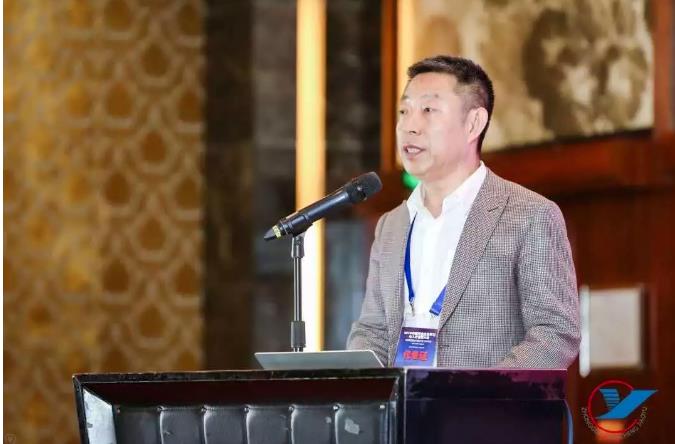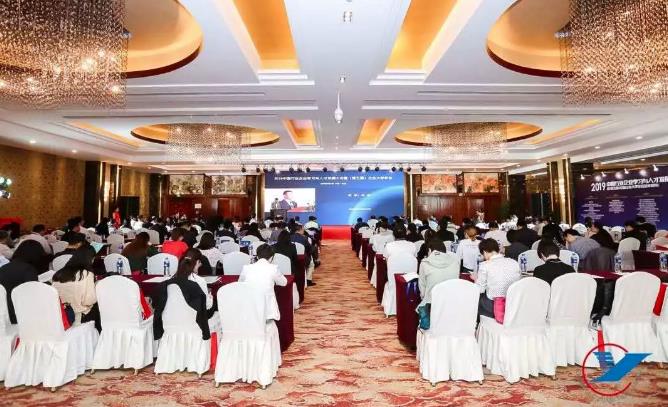 The 2019 China Enterprise Learning and Talent Development Conference and the 5th China Enterprise College Annual Meeting co-sponsored by Distance Education in China and the China Enterprise College Federation was held on 10th May 2019.
The 2019 China Enterprise Learning and Talent Development Conference and the 5th China Enterprise College Annual Meeting co-sponsored by Distance Education in China and the China Enterprise College Federation was held on 10th May 2019.
The theme of the conference was "Industry-Teaching Integration, Win-Win Future,” focusing on key issues of industry-teaching integration. More than 200 people, including well-known industry experts and scholars, industry enterprise managers, corporate HR heads, presidents of enterprise college, heads of the continuing education schools of colleges (Training Centres), vocational colleges, and training service agencies from around China attended the conference and conducted in-depth discussions.

Deputy Party secretary of the Open University of China (OUC), Liu Chen, delivered a speech at the opening ceremony. Below is the text of the speech.
The 2019 China Enterprise Learning and Talent Development Conference and the 5th China Enterprise College Annual Meeting was held on the occasion of the 70th anniversary of the founding of the People's Republic of China and the 40th anniversary of the founding of open universities (RTVUs) in China. Please allow me to extend a warm welcome on behalf of the OUC to all leaders and guests at the conference.
The theme of this conference is "Industry-Teaching Integration, Win-Win Future.” Deepening the integration of production and teaching is one of the reform task specified clearly in the 19th CPC report. According to The Office of the State Council's Opinions on Deepening the Integration of Industry and Teaching, the main goal of deepening the integration of industry and teaching is to fully implement college-enterprise collaborative education. It is expected that in about 10 years, a positive, coordinated development model for industry-teaching integration should be established. Based on how the heads of National Development and Reform Commission (NDRC) interpret the Implementation Methods for Building an Industry-Teaching Integration Enterprise (Trial), a task such as this that transforms the social consensus of "looking for talent" into "investing in people" not only complies with the needs of education reform, but also meets the requirements of enterprise development. It is a key part of promoting high-quality economic development.
In order to complete this important strategic task, colleges and enterprises should unite and break down the limits of the system and mechanism to carry out innovative exploration. Building a bridge for cooperation between colleges and enterprises is the original intention of the organiser Distance Education in China. It is for this reason that the magazine has held the conference over the past couple of years.
According to China Education Modernisation 2035, we should strengthen the continuing education and social training service functions of higher education institutions and carry out multi-type and multi-form continuing education for employees. The OUC's non-degree continuing education adheres to the "three orientations”: facing ministry industries, facing the OUC organisational system, and facing society. It has started the construction of a new type of business model for non-academic continuing education, with the integrated design of degree and non-degree continuing education, online and offline integration, connection between vocational education and continuing education, integration of production and teaching, college-enterprise cooperation, work-study balance, and a combination of education's public welfare attributes and marketisation mechanism.
The OUC has its own advantages in carrying out non-degree continuing education, as it has accumulated 40 years of quality education training resources, system linkages, and operation experience, as well as effective connections between non-academic continuing education and the credit bank. Among them, its biggest advantages are system linkages and system operation. The non-degree continuing education depends on everyone's effort. The OUC has 45 branches, 13 industry colleges, 1,125 prefectural RTVUs, 2,300 study centres, and more than 30,000 teaching sites, and has gradually formed an OUC Community. It has set up non-degree continuing education pilot projects in Beijing, Shenyang, Ningbo, Hubei, and other branches and colleges, initially establishing an organisational system-based non-degree continuing education collaborative working mechanism and realising the standardised deployment and operation of new business models. The headquarters provides national ministries and commissions, industry enterprises, and other vertical systems with overall solutions for on-the-job training and the exploration and evaluation of non-degree continuing education programmes. The OUC cooperates with the system to carry out non-degree continuing education projects and adheres to a mechanism of responsibility sharing, risk sharing, and benefit sharing. As an "open" university, we are willing to join hands with industry enterprises and university leaders to contribute to the implementation of our country's industry-teaching integration strategy.
Distance Education in China serves as an important window on national industries and industry enterprises for the OUC. Since 2009, Distance Education in China has focused on the development of industry enterprise training. It has worked together with prestigious universities such as Peking University and well-known enterprise universities to found a special organisation, the China Enterprise University Federation. Through this organisation, it intends to gather together the heads of many industry enterprises in the field of industry training, the heads of training centres, and famous experts and scholars in order to build a platform for communication and exchange between universities and industry enterprises, building a bridge for skills-based talent training. As the theme of this conference suggests, we should join hands, overcome difficulties, and accomplish the important strategic task of industry-teaching integration.


On-site at the conference
By Distance Education in China